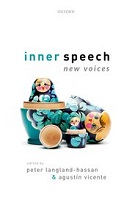Inner Speech
New Voices

Contributor(s)
Langland-Hassan, Peter (editor)
Vicente, Augustin (editor)
Language
EnglishAbstract
Inner speech lies at the chaotic intersection of numerous difficult questions in contemporary philosophy and psychology. On the one hand, inner speech utterances are private mental events of a kind. On the other, they resemble speech acts of the sort used in interpersonal communication. Thought and its linguistic expression appear to overlap. Further, inner speech is at once imagistic in nature, having a characteristic auditory-verbal phenomenology; yet it also appears suitable to carrying complex linguistic contents. In another apparent clash, inner speech episodes seem to constitute or express sophisticated trains of conceptual thought; yet, at the same time, they are deeply motoric in nature, drawing on mechanisms for speech production and perception more generally. Also, in using inner speech, we seem able both to regulate our bodily actions and, arguably, to gain a unique kind of access to our own beliefs and desires. Finally, disorders as “thought insertion” and auditory verbal hallucinations are plausibly explicable in terms of the malfunctioning of mechanisms governing speech production and perception. But there is still little on what those mechanisms are, nor in how they might be involved. This interdisciplinary volume—comprising twelve chapters by philosophers, psychologists, and neuroscientists—capitalizes on growing interest in the many questions surrounding inner speech and presents a range of new theories concerning both its nature and location within these important debates.
Keywords
inner speech, language, thought, consciousness, self-knowledge, auditory verbal hallucination, speech act, reasoning, forward models, motor controlDOI
10.1093/oso/9780198796640.001.0001ISBN
9780198796640Publisher
Oxford University PressPublisher website
https://global.oup.com/Publication date and place
Oxford, 2018Classification
Philosophy of language
Psycholinguistics
Philosophy of language
Psycholinguistics and cognitive linguistics
